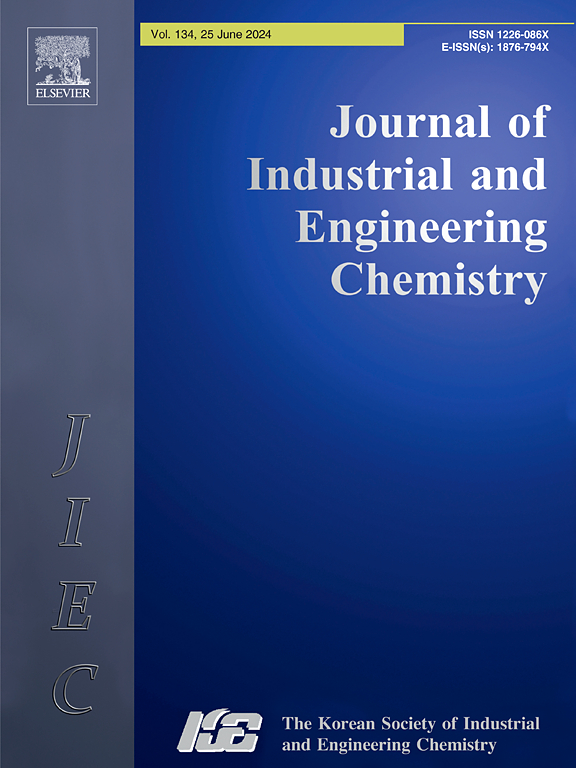从马尾藻中优化生态友好型生物精炼工艺:实现零废物的可持续方法
IF 5.9
3区 工程技术
Q1 CHEMISTRY, MULTIDISCIPLINARY
Journal of Industrial and Engineering Chemistry
Pub Date : 2024-08-08
DOI:10.1016/j.jiec.2024.08.008
引用次数: 0
摘要
本研究探讨了利用亚临界水处理(SWT)技术从未获充分利用的海洋生物质中提取功能性化合物的生态友好型方法,特别是在Ⅴ类海洋生物质中。我们的目标是在可持续的生物精炼过程中实现完全的价值化,并且不产生任何废物。利用响应面方法,我们确定了最佳萃取条件,以最大限度地提高Ⅳ......中总酚含量的产量。 最佳条件确定为温度 195.43 ℃、反应时间 18.82 分钟、固液比 0.032 g/mL。对优化提取物(OSE)进行了分析,结果显示总酚含量为 29.01 ± 0.28 毫克绿原醇当量/克,总黄酮含量为 10.33 ± 0.48 毫克槲皮素当量/克。超高效液相色谱-电喷雾电离四极杆飞行时间质谱显示了 64 种酚类化合物,包括酚酸、黄酮类和其他多酚。核磁共振光谱证实了 OSE 中含有多糖和酚类化合物。此外,残留物分析表明,剩余生物质具有生产生物燃料的潜力,有助于实现零废物生物精炼工艺。这项研究为高效提取和加工 OSE 中的酚类化合物奠定了理论基础,并提供了实用指南,表明使用 SWT 进行可持续生物精炼工艺是可行的。本文章由计算机程序翻译,如有差异,请以英文原文为准。

Eco-friendly biorefinery process optimization from Sargassum thunbergii: A sustainable approach toward zero waste
This study explores the eco-friendly extraction of functional compounds from underutilized marine biomass, specifically on Sargassum thunbergii, using the subcritical water treatment (SWT) technique. We aim to achieve complete S. thunbergii valorization in a sustainable biorefinery process that generates zero waste. Employing response surface methodology, we identified optimal extraction conditions for maximizing the yield of total phenolic content from S. thunbergii. The optimal conditions were determined to be a temperature of 195.43 °C, a reaction time of 18.82 min, and a solid/liquid ratio of 0.032 g/mL. The optimized S. thunbergii extract (OSE) was analyzed, revealing a total phenol content of 29.01 ± 0.28 mg phloroglucinol equivalent/g and a total flavonoid content of 10.33 ± 0.48 mg quercetin equivalent/g. Ultra-performance liquid chromatography–electrospray ionization quadrupole time-of-flight mass spectrometry revealed 64 phenolic compounds, including phenolic acids, flavonoids, and other polyphenols. Nuclear magnetic resonance spectroscopy confirmed the presence of polysaccharides and phenolic compounds in OSE. Furthermore, residue analysis indicated the potential for biofuel production from the remaining biomass, contributing to a zero-waste biorefinery process. This study establishes a theoretical foundation and provides practical guidelines for the efficient extraction and processing of phenolic compounds from S. thunbergii, indicating the feasibility of a sustainable biorefinery process using SWT.
求助全文
通过发布文献求助,成功后即可免费获取论文全文。
去求助
来源期刊
CiteScore
10.40
自引率
6.60%
发文量
639
审稿时长
29 days
期刊介绍:
Journal of Industrial and Engineering Chemistry is published monthly in English by the Korean Society of Industrial and Engineering Chemistry. JIEC brings together multidisciplinary interests in one journal and is to disseminate information on all aspects of research and development in industrial and engineering chemistry. Contributions in the form of research articles, short communications, notes and reviews are considered for publication. The editors welcome original contributions that have not been and are not to be published elsewhere. Instruction to authors and a manuscript submissions form are printed at the end of each issue. Bulk reprints of individual articles can be ordered. This publication is partially supported by Korea Research Foundation and the Korean Federation of Science and Technology Societies.

 求助内容:
求助内容: 应助结果提醒方式:
应助结果提醒方式:


